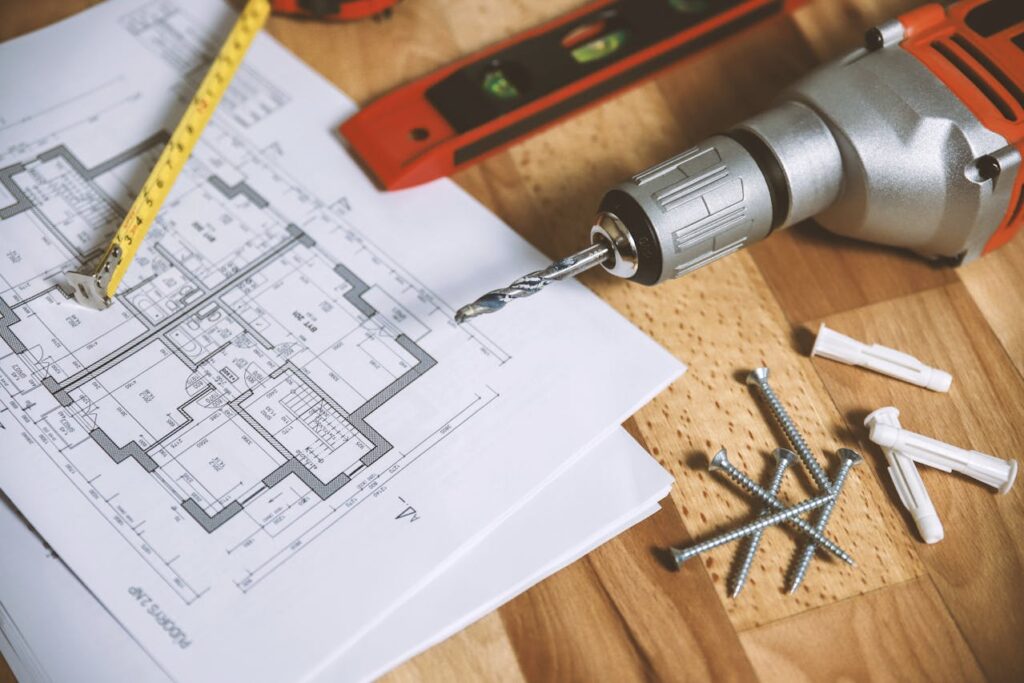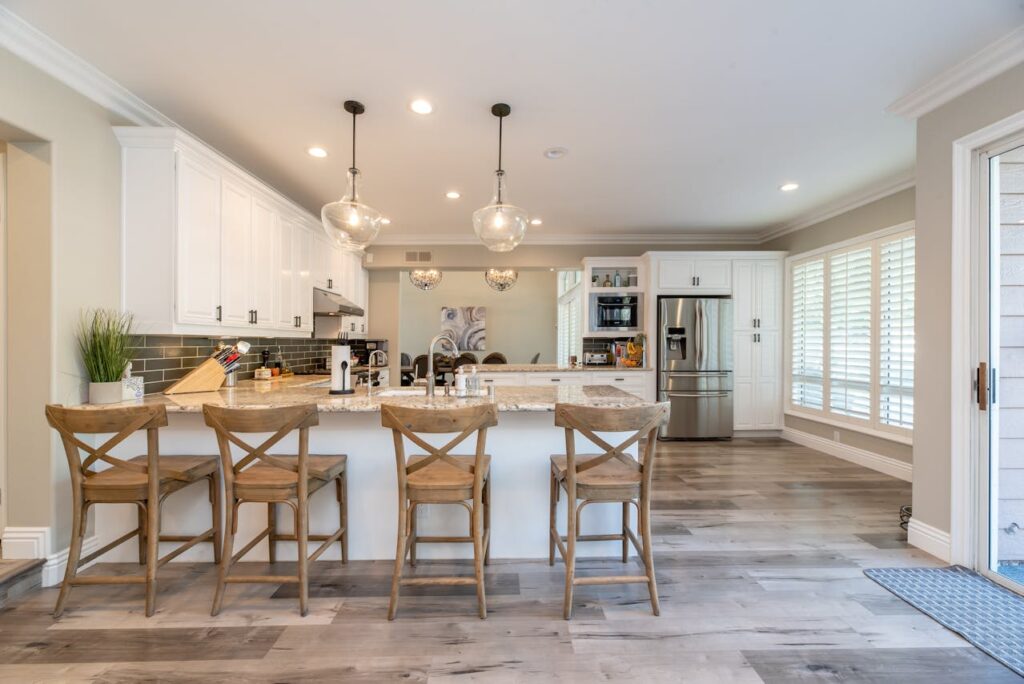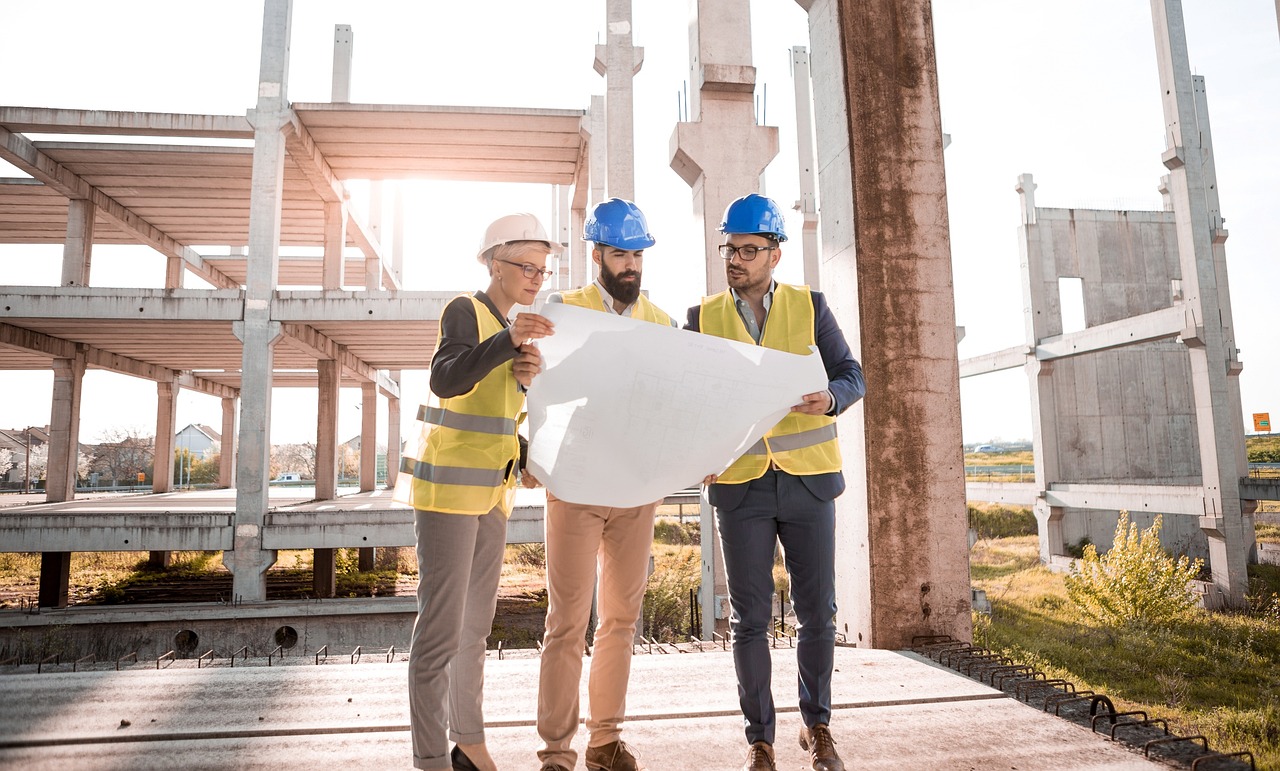Confidently Build Your Dream Home with Our Complete Handbook to Construction Loans
If you’ve always wanted to design and build your dream home, you’re not alone – about 20.4% of all single-family homes started in 2022 were custom homes. Although building your perfect home can certainly be an exciting endeavor, you might be wondering how you can pay for it. In 2023, the cost of building a new home in the U.S. averaged $313,000, not including the cost of land. If you’re like most people, you probably don’t have a few hundred thousand dollars lying around to pay for a custom home upfront. This is where construction loans can help you finance the construction of your dream home.
In this guide, we’ll be diving into everything you need to know about construction loans. From the basics of how they work to how to qualify for them, we’ve got you covered. Keep on reading to find out how to take the first step toward your perfect home!
Please note that we specialize in other non-qm alternatives such as DSCR loans and bank statement loans at Defy Mortgage. This means that we currently do not offer residential ground-up construction loans from primary residences at Defy Mortgage, and we do not provide owner-builder loans for primary residences. Builder approvals are required for select financing options for primary residences.
What Is a Construction Loan?
Construction loans are a type of mortgage that are specifically designed to cover the costs of building a new property from the ground up or for major renovations on existing properties. These loans are generally short-term and the funds are released in stages as construction progresses, rather than as a lump sum all at once. This schedule helps to ensure that the funds are used for the intended purpose at each phase of construction.
To make the financing process easier for borrowers, lenders offering construction loans have made the steps much more efficient and streamlined. These loans were designed to prioritize convenience, speed, and adaptability, which is why tax return documentation typically isn’t required. All of this results in a swift closing process and borrowers can get started on their projects as soon as possible – sometimes even in as little as two weeks.
Because of the unique qualification requirements for a construction loan, these loans are considered to be non-QM loans (non-qualified mortgages). This simply means that they don’t have to follow the strict lending rules that are set by the Consumer Financial Protection Bureau (CFPB), meaning they’re more flexible than conventional loans.

How Do Construction Loans Work?
Construction loans help you finance the entire construction process – from buying the land and getting permits to materials and labor (both hard and soft costs). However, the funds aren’t provided all at once and are released in installments. This process is called the “draw process”, which is where an inspector will periodically assess the progress of the construction to ensure laws and regulations are being followed. If everything looks good, you can keep receiving a consistent cash flow of funds to continue building or renovating. When the home is fully constructed, a certificate of occupancy will be issued.
Since construction loans are a type of short-term financing, you’ll have to obtain long-term financing after the project is completed if you plan to live in the home yourself or keep it for investment purposes. Depending on your lender, they may be able to help you with refinancing the remaining balance to a new loan with a longer term.
Who Would Benefit From a Construction Loan?
A construction loan is a fantastic option for anyone looking to build a property from the ground up or rehab an existing property. This includes, but is not limited to:
- Seasoned and novice real estate investors
- Builders
- Individuals looking to build a custom home from the ground up
- Land owners looking to build
- Home flippers
Construction Loan Qualification Requirements
When it comes to qualification requirements, each lender can set their own criteria. This means that there’s no set requirements for all construction loans within the mortgage industry. If you’re still in the research phase and are wondering what the requirements are, we recommend reaching out to lenders directly to get more information.
It varies by lender, but here is what lenders usually require for construction loans:
- Minimum FICO score
- Maximum loan-to-cost (LTC)
- Maximum loan-to-as completed value (ARV)
- Maximum loan amount
- Fixed interest rates
Defy specializes in alternative financing like DSCR loans and other non-qm lending options offering flexible solutions for borrowers who don’t fit the traditional mold. Schedule a free consultation or call us at (615) 622-1032 and one of our mortgage experts would be happy to help!

Construction Loan Interest Rates
Interest rates for construction loans can vary depending on several factors like the current market rate, the lender, and your credit score. While it’s difficult to provide an exact rate, you can generally expect construction loan rates to be slightly higher than conventional rates. Despite higher rates, construction loans provide you with the opportunity of custom building your home to make it your dream home. On top of that, since these loans are short-term, you can easily refinance to a longer-term loan after the project is completed, which may provide you with a lower rate.
Construction Loans vs. Conventional Loans
Construction loans and conventional loans serve completely different purposes in the real estate lending world. Because of this, they’re structured quite differently.
Construction loans are short-term loans that are designed to finance the building of new homes or large renovations. They provide funds in stages as the project progresses, which helps manage and monitor the construction process. Borrowers typically only have to make interest-only payments during the construction phase. To qualify, lenders usually evaluate the borrower’s historical experience and the construction plans.
In contrast, conventional loans are long-term loans used to purchase existing properties. These loans are often seen as “standard” mortgages since most people who follow the traditional path tend to get a conventional loan to finance their home.To qualify, borrowers need to provide proof of income using documents like W2s, pay stubs, and tax returns.
Construction Loans vs. Fix-and-Flip Loans
Construction loans and fix-and-flip loans are both loans that finance real estate projects, but they cater to different types of projects. While construction loans focus on creating new properties or extensive remodels, fix-and-flip loans are geared towards quick renovations and fast sales.
Construction loans are designed for building new homes or undertaking major renovations, providing funds in stages as the construction progresses. These loans are typically short-term and involve interest-only payments during the construction phase, with the potential to transition to a permanent mortgage once it’s completed.
On the other hand, fix-and-flip loans are short-term loans specifically aimed at investors looking to buy, renovate, and quickly resell a property for profit. Fix-and-flip loans usually cover both the cost of acquiring the property, as well as the estimated renovation costs. Typically, borrowers are only expected to pay interest on the loan during the flipping process and repay the remaining loan balance with the proceeds from the sale.
Construction Loans vs. HELOC
Construction loans and home equity lines of credit (HELOC) are both types of home loans, but they’re structured quite differently and can be used for different purposes. HELOCs tend to offer ongoing access to funds, similar to a credit card, making them much more flexible for a variety of different needs compared to construction loans.
Construction loans are short-term loans specifically designed to finance the building of new homes or major renovations. These loans provide funds in stages as the project progresses, typically with interest-only payments during the construction period.
On the other hand, a HELOC is a revolving line of credit secured by the equity in an existing property. Homeowners can draw from the HELOC as needed, up to a certain limit, to finance any expenses – not just renovations or repairs. Some people take out HELOCs to pay off their medical bills, children’s college tuition, or other unexpected expenses.

Types of Construction Loans
Often, you’ll see the term “construction loans” being used as an umbrella term to encompass several different types of loans. Here are three of the most common types of construction loans you’ll see on the market:
- Ground-Up Construction Loan: A ground-up construction loan is a short-term loan used to finance the construction of a new building from the ground up. It covers the costs of land acquisition, construction materials, labor, and permits, with funds typically disbursed in stages as the project progresses.
- Fix-and-Flip Loan: A fix-and-flip loan is a short-term loan designed for real estate investors who purchase properties with the intention of renovating and quickly reselling them for a profit. These loans provide funds for both the purchase and renovation of the property.
- Fix-and-Hold Loan: A fix-and-hold loan is a type of financing used by real estate investors who purchase properties, renovate them, and then retain ownership to generate rental income. Unlike fix-and-flip loans, fix-and-hold loans are intended for longer-term investment, where the investor renovates the property to improve its rental potential and holds onto it for a longer period of time.
Pros and Cons of Getting a Construction Loan
Pros:
- Provides a path to building your dream home
- Faster approval process
- No tax returns required
- Interest-only payments required during construction phase
- Potential for property value to be higher than expected
Cons:
- Slightly higher interest rate
- Short-term loan, meaning you’ll have to refinance if you plan to keep the property for longer
- Risk of project delays due to weather, contractor issues, or unforeseen problems
Tips for Obtaining a Construction Loan
If you’re thinking of getting a construction loan, here are some tips to consider:
- Create a Budget: Having a well-planned budget can not only help you get a loan but also helps you to determine your potential return on investment (ROI).
- Prepare Construction Plans and Obtain Permits (if necessary): In addition to a budget, lenders will typically ask for construction plans and permits to assess the project.
- Understand the As-Completed Value: This is the value of the property after construction or rehabilitation is completed. A state-certified appraiser will consider estimated costs, plans, and specifications of the improvements before construction begins.
- Secure Down Payment and Cash Reserves: A construction loan requires a down payment and cash reserves to mitigate the lender’s risk.
- Know Your Long-Term Options: If you plan to keep the property as a long-term investment or use it as a primary residence, consider all of the loan options that are available to transition out of the construction loan. Construction loans are short-term, so after construction is completed, borrowers have to make an informed decision about their long-term plan. As always, Defy can help you figure out what option may be best for you if you are interested in exploring other non-QM lending options.

Construction Loan Alternatives
If you’re unsure if a construction loan is for you, there are plenty of other alternative loan solutions that might be the perfect fit. Here are some other options to consider:
- Fix-and-Flip Loans: While under the “construction loan” umbrella, fix-and-flip loans are structured a bit differently to traditional ground-up construction loans. Funds to purchase an existing property and renovate it are disbursed upfront.
- Fix-and-Hold Loans: Similarly to a fix-and-flip loan, funds are provided upfront to acquire and fix up a property. The main difference is that fix-and-hold loans are for investors who plan to keep the property as a long-term investment.
- Debt-Service Coverage Ratio (DSCR) Loans: These loans are for properties that generate rental income. Lenders evaluate the property’s cash flow using the DSCR metric to see if it can “pay for itself”.
- Bank Statement Loans: These loans consider a borrower’s bank statements and the average monthly deposits instead of their traditional income documents like tax returns, W2s, and pay stubs.
- Home Equity Options: If you’re already a homeowner that has built up significant equity in their home, you can unlock that home equity to fund renovations. Some options include a home equity loan, a home equity line of credit (HELOC), or a cash-out refinance.
Construction Loan FAQs
- What are construction loans?
Construction loans are a type of short-term financing option that covers the expenses of building a new home or completing a major renovation.
- What can construction loans be used for?
Construction loans can be used for building a new home from the ground up, significant renovations, or fix-and-flip projects where you buy, renovate, and resell a property.
- Are construction loans hard to get?
No, they’re not hard to get! Alternative mortgage lenders, like Defy, who have experience with specialty loans, like DSCR loans, or construction loans for other lenders who offer them, make it easier than ever to get a construction loan.
- How do ground-up construction loans work?
For ground-up construction, the loan is disbursed in stages as the project progresses. An inspector verifies each phase is complete before releasing funds for the next.
- How do construction loans work for renovations?
Construction loans for renovations function similarly, providing funds in stages for major home improvements. For fix-and-flip projects, short-term loans cover the purchase and renovation with the goal of a quick resale.
- Are construction loans higher interest?
Interest rates for construction loans depend on the lender, current market rates, and your credit score. While you can expect interest rates to be slightly higher for construction loans compared to conventional loans, they are short-term loans and you can often refinance to a lower rate once the project is completed. Similar to 30-year fixed rates, construction loan interest rates will fluctuate with the market.
- Can construction loans include land?
Yes, construction loans can include the cost of purchasing land as part of the overall project financing. This makes it much easier for borrowers to finance both the land and construction through a single loan.
- Can you get a construction loan with bad credit?
Getting a construction loan with bad credit can be difficult, but not impossible. Since each lender sets their own requirements, you may be able to find a lender that’s willing to accept your credit score.
- What credit score do I need to qualify for a construction loan?
While specific credit score requirements vary by lender, minimum credit scores typically range from 620 to 680.
- What are the requirements to qualify for a construction loan?
Requirements can vary significantly depending on the lender.
- Can you get a construction loan if you aren’t looking to fix-and-flip?
Absolutely! Construction loans aren’t just for fix-and-flips. You can use them to build your dream home or complete a major renovation to enjoy for yourself.
- What’s the difference between a construction loan and a conventional loan?
Construction loans are short-term and disbursed in stages, while conventional loans are long-term, one-time lump sums used to purchase an existing property. Qualifying for a conventional loan requires traditional income documents, like pay stubs, W2s, and tax returns, whereas construction loans typically rely on historical experience and construction plans.
- Where can you get a construction loan?
Construction loans are offered by alternative mortgage lenders who are often very experienced in funding specialty loans, like construction loans. We offer many other types of loans here at Defy! Please note that we currently do not offer residential ground-up construction loans from primary residences at Defy Mortgage, and we do not provide owner-builder loans for primary residences. Builder approvals are required for select financing options for primary residences.
- Do you need to show tax returns to get a construction loan?
No, tax returns aren’t necessary! Construction loans are often approved based on a proven track record or construction plans.




